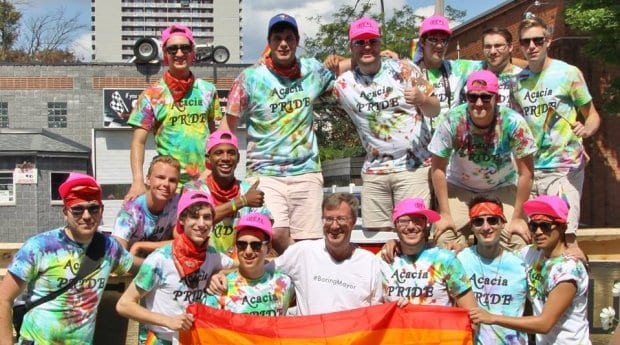The frat boys marched at Pride and they liked it.
Carleton University’s chapter of Acacia Fraternity joined the Capital Pride parade with enthusiasm, dancing and a flatbed truck loaded with a super-sized beer-pong table.
“I believe we’re the first fraternity to march in the Capital Pride parade ever,” says Eric Lauer, the chapter president. “It feels amazing. After we did that huge Pride parade, we felt like we made history for a moment.”
Darren Park, an alumni member, first raised the idea with Lauer. In high school, a friend of Lauer’s came out to him a few years before coming out to other people. Lauer was supportive of his friend, but it bothers him that coming out is still an issue in this day and age.
“That was a driving force for me, personally, to kind of turn this idea into something that was real,” he says.
Chase Ferguson, who joined Carleton’s Acacia Fraternity in 2011 and graduated this spring, says taking part in the Pride parade is an important step in changing people’s minds about fraternities.
“There’s a stigma, I guess you could say, within fraternity culture — or at least a bad reputation for dealing with things like homophobia and acceptance,” Ferguson says. “We felt that didn’t reflect our organization or values at all, and we wanted to help promote the idea that our fraternity is openly accepting of gay members. We are very proud to promote the LGBTQ community, and this seemed like a good opportunity to share that.”
Ferguson is well aware that the phrase “frat boy” is rarely meant as a compliment, and the stereotype of a frat house as a bastion of booze and white male entitlement can be hard to dispel.
“It can be frustrating,” he says of negative attitudes about fraternities. “We have guys from all walks of life. We have all races, religions, a very diverse group of guys, and it’s by no means just a way to have parties.”
Although Acacia already has gay members, Ferguson hopes more LGBT students will consider Greek life.
“I feel there’s maybe a hesitation with either closeted or openly gay students [to join a fraternity because] they have preconceived ideas about what a fraternity is,” he says. “Based on those ideas, they might not look into a fraternity and see that there are benefits to being a member of one.”
Beyond socializing, there are opportunities within fraternities to develop leadership skills. A big emphasis is placed on community service, from street cleanups to raising money for organizations like the Canadian Cancer Society, he says.
Lauer is excited about Acacia’s partnership with Get Real, a student-run, non-profit organization that recently opened a chapter at the University of Ottawa. Get Real offers anti-homophobia workshops in middle schools and high schools, as well as awareness campaigns in universities.
Between the partnership with Get Real and an overwhelmingly positive community response to Acacia’s marching in the Pride parade, the fraternity president says the future looks bright. Other fraternities and sororities have contacted him to say well done and that they plan to march in next year’s parade.
“I think the change is already happening now,” Lauer says.


 Why you can trust Xtra
Why you can trust Xtra


